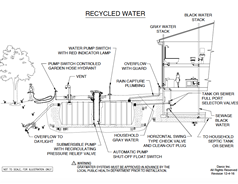Grey Water Recycle Tanks
Underground Recycled Water Storage Tanks
RECYCLED WATER use is a much-debated topic in the Public Health sector today. Generally, citizens are interested in reusing water and many homes are currently being fitted with gray water recycle storage tanks. Much of this is being done by individual homeowners without jurisdictional approval. They want to conserve laundry water, bath water, rainwater, etc. The problem is unanticipated contamination which can render the storage tank a health hazard and a festering, stinking mess. The reuse of household gray water can be dangerous if improperly collected or if potable water is cross contaminated, which is exactly why Public Health Officials are having a tough time dealing with what seems to be such a good idea to the general public.
Darco manufactures underground water storage tanks that can be used for gray water storage.
Our advice at Darco:
- Always talk with your City or County Department of Public Health before moving ahead.
- Do your homework to understand the concept and the possible health risk.
- Isolate black water (sewage) into a separate dedicated piping system.
- Install a selector isolation valve routing gray water either to storage or sewer / septic tank.
- Install a check valve to prevent sewage backflow into the gray water system.
- Avoid contamination from food scraps, human waste, and body fluids.
- Do not store soapy gray water for extended periods of time (over the winter).
- Use gray water only for outside irrigation rather than household tasks.
- Dilute collected household gray water with rainwater.
A few typical “common sense” Gray Water guidelines:
-
- Be sure your family understands and follows the Household Gray Water Rules.
- The safest gray water sources are rain, laundry machines, and bathtubs or showers.
- Detergents do not necessarily improve the water quality of gray water so do not use excess soap.
- When you have house guests who may not understand or follow the rules, turn your selector valve to sewer position to bypass potential contamination.
- We do not recommend collecting water from the kitchen sink or dishwasher as food scraps and grease will decompose over time and contaminate the system.
- Urination in the shower must be forbidden (common with young boys).
- Laundry water from clothing badly soiled with excrement, blood, or vomit should be bypassed to the sewer or septic tank.
- Do not spit into hand sinks if plumbed into the gray water system.
- Avoid water from bathing a dog, flushing an aquarium, or cleaning a pet’s cage.
- The addition of rainwater helps dilute and “sweeten” household gray water.



